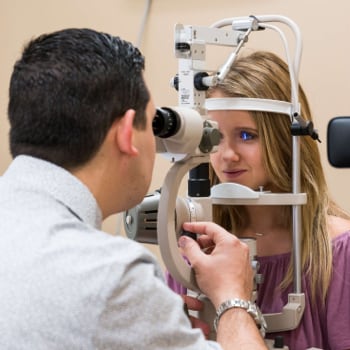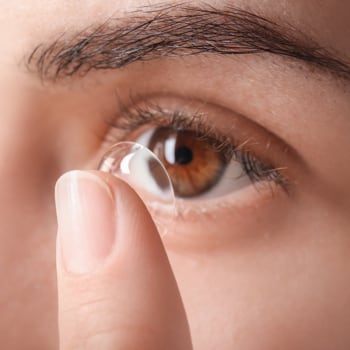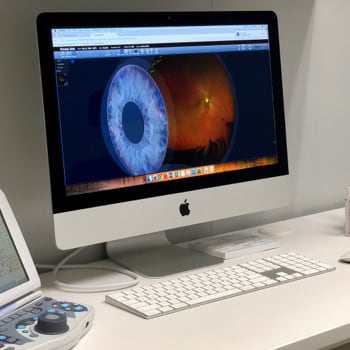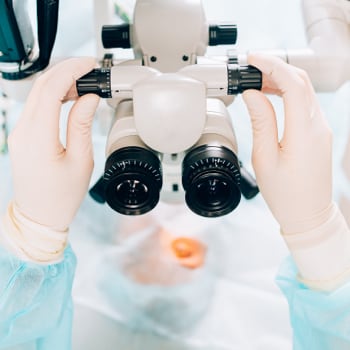Glaucoma is often referred to as the “silent thief of sight” because it typically shows no symptoms until significant vision loss has occurred. This is why keeping up with regular eye exams is important to catch glaucoma early.
If you’ve been told someone in your family has glaucoma, you might be wondering, “Is glaucoma hereditary?” The short answer is yes, family history plays a big role, but there’s more to the story.
What Is Glaucoma?
Before we get into whether glaucoma is hereditary, it’s worth understanding what glaucoma is. Glaucoma is a group of eye conditions that damage the optic nerve, which is essential for good vision. This damage usually results from abnormally high pressure in your eye (though not always.)
Without proper treatment, glaucoma can lead to permanent vision loss—making early detection and management critical.
The two main forms of glaucoma are:
- Open-angle glaucoma (the most common type): This occurs when the eye’s drainage canals become clogged over time. Think of it like a leaky faucet that slowly fills a sink.
- Angle-closure glaucoma (less common but more severe): This happens when the drainage canals are suddenly blocked, causing a rapid rise in eye pressure. This is considered a medical emergency.
Is Glaucoma Hereditary?
Yes, glaucoma can run in families. If someone in your family has been diagnosed with glaucoma—particularly a parent or sibling—you’re at higher risk of developing it yourself.
How Does Family History Impact Risk?
Research shows that individuals with a family history of glaucoma are much more likely to develop the condition compared to those without a family history. Why? Genes. Certain genetic markers are linked to the development of glaucoma, making it more likely to be passed down from generation to generation.
Which Types of Glaucoma Are More Likely to Be Hereditary?
Although all forms of glaucoma can have a hereditary component, some are more influenced by genetics than others:
- Primary Open-Angle Glaucoma is the most common hereditary form.
- Juvenile Open-Angle Glaucoma, a rarer form occurring in adolescence or early adulthood, has a strong genetic link due to mutations in specific genes, like MYOC.
- Congenital Glaucoma, present at birth, is often tied to inherited genetic conditions.
Will I Get Glaucoma If It Runs in My Family?
Not necessarily. While genetics can increase the likelihood of developing glaucoma, they’re just one piece of the puzzle. Many other factors—age, race, eye injuries, and general health—also come into play. For example:
- Age is a significant risk factor. People over 60 are at a higher risk.
- Race matters, too. African Americans are more likely to develop open-angle glaucoma, while Asian populations are at greater risk for angle-closure glaucoma.
Essentially, having a family history puts you in the “higher risk” category, but it’s by no means a guarantee.
Other Risk Factors to Watch Out For
Even if you don’t have a family history, other factors can still increase your risk of developing glaucoma:
- High Eye Pressure (Ocular Hypertension): Elevated intraocular pressure (IOP) is one of the primary risk factors.
- Medical Conditions: Conditions like diabetes or high blood pressure can increase risk.
- Corticosteroid Use: Long-term use of steroids can heighten the likelihood of glaucoma.
If any of these factors apply to you, it’s essential to stay on top of regular eye exams.
How to Protect Your Vision

Hearing that glaucoma might run in your family could naturally make you anxious. But the good news? There are plenty of proactive steps you can take to reduce your risk or catch any issues early on.
Get Regular Eye Exams
If you have a family history of glaucoma, don’t skip those annual eye doctor visits! Early detection can mean the difference between maintaining your vision and experiencing permanent damage. Most experts recommend annual comprehensive eye exams starting at age 40—or earlier if you’re at higher risk.
Monitor Your Eye Pressure
Your eye doctor will often measure your intraocular pressure as part of your appointment. If your pressure is elevated, they may start treatment even before glaucoma symptoms appear.
Maintain a Healthy Lifestyle
Lifestyle choices can impact your overall eye health. Here’s what can be helpful:
- Exercise regularly: Physical activity helps reduce eye pressure.
- Eat for eye health: Foods rich in antioxidants and omega-3s, like leafy greens and fish, can support eye health.
- Limit screen time: Reduce screen exposure and take breaks to avoid eye strain.
- Avoid sun damage: wear UV-blocking sunglasses and a wide-brimmed hat outside to protect your eyes from the sun.
Know the Warning Signs
A lot of people don’t realize that symptoms like blurry vision, halos around lights, or eye pain could be early signs of glaucoma. Pay attention to changes in your vision and consult a doctor if anything feels off.
When to Call an Eye Doctor
If you experience any of the following symptoms, seek medical attention immediately:
- Sudden loss of vision.
- Severe eye pain.
- Redness or swelling in the eye.
- Halos around lights.
These could signal acute forms of glaucoma that require urgent treatment.
Keep Your Eyes Healthy
By taking your eye health seriously, you can take steps to catch glaucoma early, whether you’re at a high risk of developing it or not. At Great Hills Eye Care, we offer comprehensive eye exams to help you monitor for glaucoma symptoms before it causes damage to your eyes. Book an appointment for your next eye exam with us today.














